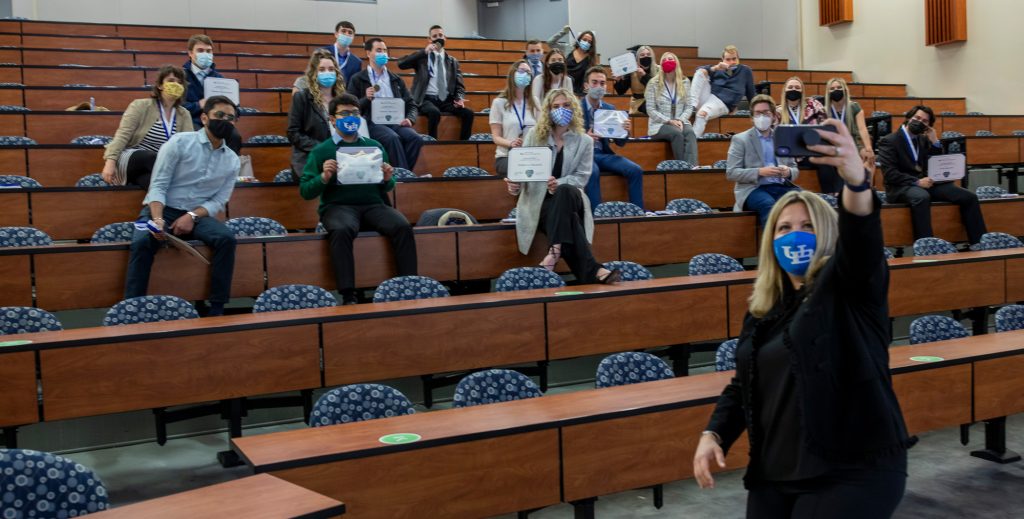Receiving and acting upon feedback is critical to personal development and team success. Here’s how you can effectively use feedback to grow—whether you’re on the soccer field or in the C-suite.

By Jaimie Falzarano

“Run faster! You can get there—go, go, go!” my mother shouted on the sideline of a soccer game. My mother was dedicated to our extracurriculars, attending almost all my games and always vocal—until she wasn’t, because at 13, I yelled across the field, “Shut up mom!” Well, she stopped talking to me for two weeks.
As I sat down to write this post, that story came to mind. It had been a while since I thought of it, but there it is, full of feedback—my mother giving it to me, me not taking it so well, me giving her some back and her not taking it so well either. What a pair we were. I am happy to report that we have come a long way, and I now consider her my best friend.
Over the years, I have attended workshops, read articles and practiced giving feedback extensively before I had to give it. In fact, most leaders spend a great deal of time learning how to give feedback. But how much time have you spent thinking about and preparing to receive feedback?
It seems so simple, but the reality is we don’t often consider that part of the process, despite having the most control over it. If you can prepare yourself, your team and your organization to continuously ask for feedback and be prepared to receive it, the opportunity for growth is exponential.
Here, I share some ideas to help you receive feedback most effectively, based on my own experiences and knowledge, as well as a great book I read recently: Thanks for the Feedback by Douglas Stone and Sheila Heen, who also wrote Difficult Conversations, serve as lecturers at Harvard Law School and co-founded Triad Consulting.
What type of feedback do you need?
Receiving feedback is not a passive role. As a receiver of feedback, you are an active participant in the conversation, and what you take out of it and how you can grow from it is up to you. So, just like I tell my LeaderCORETM students on the first day of class, approach it with a growth mindset. What you hear may not be all true, the giver may not have all the facts and you may not agree with them, but it is their perspective and there are probably some insights that can help you on your development journey.
Make sure you and the giver are on the same page. Are you clear on what kind of feedback they are giving you? Stone and Heen categorize feedback into three types:
- Appreciation: to motivate and encourage.
- Coaching: to increase knowledge, skills and capabilities.
- Evaluation: to tell you where you stand and align expectations.
We need all three. But if you walk into a conversation expecting evaluation and you get appreciation, you walk away missing something. So, speak up and clarify with the giver what type you need and what type you believe they are giving. It is better to know you are on different pages than to assume you are on the same page.
One way to be active in the feedback is to be curious. Many years ago, a member of my team always asked for examples when I gave her feedback. The first few times she asked, I was taken aback. Ultimately, it made me a better giver of feedback. She was fully engaged in the conversation and wanted to hear what it looked like to me. As a receiver, asking for examples—what it looks like to them, how it impacted the giver—can provide you with valuable information. Add the phrase, “Tell me more,” to your vocabulary.
Are you actively listening?
When they do tell you more, listen. I mean really listen. Listen to understand the facts they are sharing, their perspective and their overall message for you. This is when we have to step aside from being defensive or interjecting to give more information. Your role at this point is to ask clarifying questions and really work to get at the heart of what they are telling you.
After you really hear them, what data can you take from what they said? What information can be insightful or helpful? Is there anything you have heard before, possibly a theme? Ultimately, are you able to take out some information that can help you grow and develop?
The hard part to overcome here are your triggers; Stone and Heen talk about these extensively in the book. We have truth triggers, relationship triggers and identity triggers. If you recall a time you received feedback and felt defensive, chances are one of these triggers were hit. If we can learn how to understand and use these triggers, we can take the feedback as information to help us grow.
A quick overview of each:
- Truth trigger: Rather than, “That’s wrong,” instead try, “Can you give me an example?” Take the opportunity to learn more about how someone else sees you and reduce your blind spots.
- Relationship trigger: “Who are you to tell me that?” When we hear that voice in our head, ask, “What am I contributing to this situation between us?” Try to remove your history or the roles you typically have.
- Identity trigger: “I always mess everything up.” Instead, move into growth mode and ask, “What can I learn and how can I adapt to do better next time?”
Once you have listened to understand—while also recognizing your internal (or external) response to what they are saying—you can hopefully glean some helpful data to identify what you can do to grow and develop. Then, you can take some ownership and action.
How will you move forward?
You will not agree with everything that is said. Additionally, there may be part of the conversation where you have information to share that can shed light on the subject. But as you decide which data is helpful (because it will not all be helpful) and what to take action on, share that with the giver. Share which piece of feedback you found most helpful and what you plan to do going forward. If you believe they can be helpful in your development, ask them to help. Speaking out loud and taking ownership shows you and the giver that you took their feedback wholeheartedly and were an active participant in the conversation.
Eventually, my mother and I spoke, and while she didn’t say it, her feelings were hurt. Yelling “shut up” across the soccer field was not my best moment. My mom was trying to motivate me, and I heard evaluation. Once we clarified, and I asked for what I needed while I was on the field, it got better. She kept coming to all my games and events, and today she is definitely the person I go to for appreciation, coaching and evaluation the most.
An executive coach, Jaimie Falzarano is managing director of the UB School of Management’s LeaderCORETM program, a personal and professional development journey for UB graduate students. Falzarano leads the program and its strategic direction, and teaches its core courses. LeaderCORE students use reflection logs and a competency model—developed with input from employers and alumni—and work with coaches or a personal board of directors to increase their self-awareness, develop their competencies and prepare for the world of work. Learn more at http://mgt.buffalo.edu/about/leadership/leadercore.
